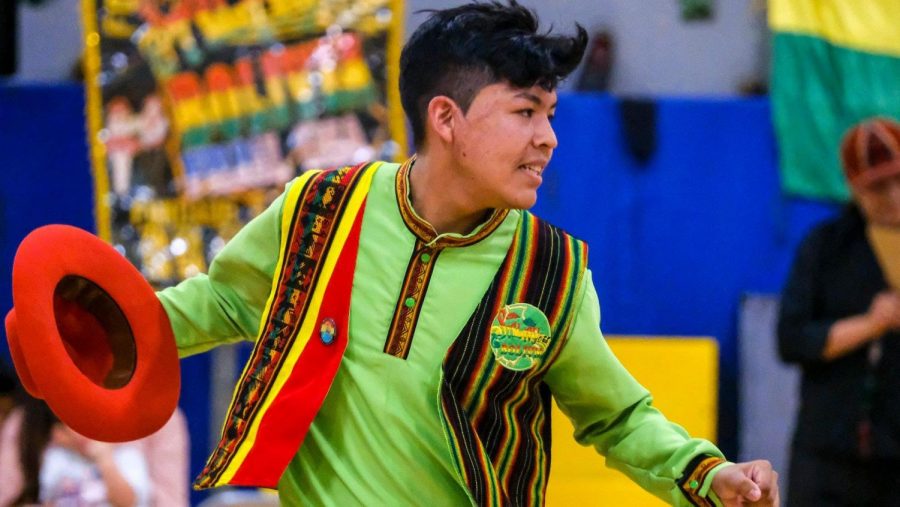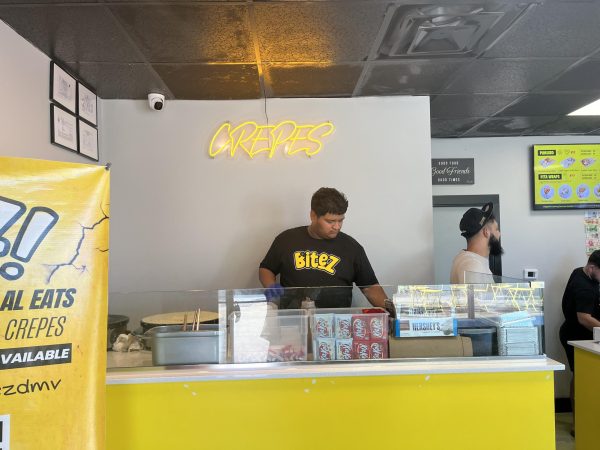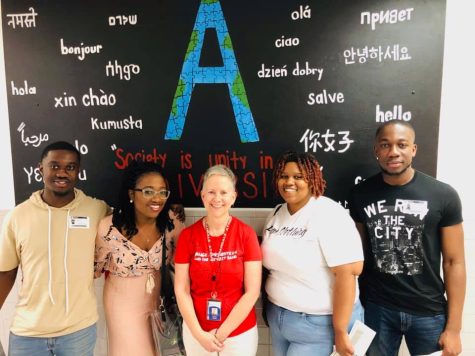Celebration
Students observe Hispanic Heritage Month
Junior Nick Belmonte dances a traditional Bolivian dance at the Salay Bolivia USA Open House earlier this year at Patrick Henry Elementary School.
Hispanic Heritage Month is a long-standing national observance in the U.S., mostly for the culture and arts of Hispanic nations.
Spanning a four-week period over two months, the commemorative period starts on Sept. 15 and lasts to Oct. 15.
It starts on this date because that is when five Hispanic nations; Costa Rica, El Salvador, Guatemala, Honduras, and Nicaragua; celebrate their independence.
Celebration of this month began in 1968 when President Lyndon B. Johnson designated one week to recognize the 8 million Hispanics living in the country and their contributions.
By the time President Ronald Reagan extended the week to a month, the number jumped to 20 million Hispanics.
Today, there are nearly 60 million people in the U.S. who identify as Hispanic, making up nearly 17% of the population.
In this community, the presence of Hispanics is more evident. Last school year, 49% of students identified as Hispanic or Latino.
While many Hispanics celebrate their heritage every day, Hispanic Heritage Month is a time for all people to join in
the culture in an admiring and respectful manner.
Festivities include festivals and parties, amongst other events.
Perhaps the biggest event is the El Barrio Latin Jazz Festival in New York
Every year, the Hispanic Family Festival is held in Springdale, Massachusetts.
In this area, the Smithsonian Institute holds multiple events throughout the month, including tours, dance recitals, and information sessions.
“Personally, it is very nice to see other people appreciate our culture and how rich it is,” senior Andres Pacheco-Rivera said.
Here at AHS, many clubs are looking for their own ways to celebrate this month.
Spanish Honors Society is working on putting up posters around the school to honor the many Hispanic-American icons.
Past examples include singer Selena Quintanilla-Perez and activist Cesar Chavez.
In addition, they plan to change the display board in the language hallway to show their respect.
“The Hispanic community is a big part of this school, and this country as a whole, so I think it is important to honor them in some way,” SHS president Emily Shawish said. “At the same time, we can use these posters to educate people who are not aware of the importance of these figures.”
During this time period, many teachers talk about Hispanic Heritage Month in class, too.
“Most of the time, history teachers and Spanish teachers will bring it up so that we know what is going on and how much the Hispanic community impacts this country,” junior Jessica Vo said. “It is really nice because a lot of people do not know about it.”
However, the notion of Hispanic Heritage Month has always been a bit of a controversy.
The term Hispanic can be used to identify any Spanish speaker, including Spaniards.
Many Latino people, a term used to identify only those from Latin America, are upset with the fact that Spanish people are honored in this month, too.
Nowadays, most people would much rather be called Latino than Hispanic.
This is because the word Hispanic reminds them of the colonialism and imperialism that many Latin countries suffered at the hands of Spain.
Another issue with Hispanic Heritage Month is that sometimes, Afro-Latinos feel excluded.
Many celebrations do not include figures who were both Latino and black.
“Sometimes, it does feel like in these honors and posters, I am seeing a lot of fairer skinned Latinos and not a lot of darker ones that look like me,” senior Jasmine Mann said.
Today’s political tension only serves to stir more issues around the month.
There is no doubt that President Donald Trump has shown a clear antipathy towards the Latino American community.
He has cancelled DACA, putting thousands of young, undocumented Latinos at risk of deportation.
His administration has controversially separated young children from their parents.
Many of this children have been locked in immigration centers without basic necessities like toothbrushes and toilet paper.
Additionally, Trump has attacked Latinos over and over again, through both directed attacks and misleading generalizations.
It may be hard to reconcile the fact that this holiday is government-sponsored with the fact that Trump has shown harshness towards the Latin Americans.
“It must be hard for some people to attempt to celebrate this holiday when they are in fear of being deported or having something equally worse happen to them,” senior Megan Le said.
In fact, in a statement from the White House recognizing this holiday, Trump did nothing more than talk about how the Hispanic community has progressed since he took office in 2017.
There was no mention of any Hispanic figures or the accomplishments of the community.
“That is kind of disrespectful that he was basically just bragging and not talking at all about Hispanic people,” Pacheco-Rivera said.
“Especially when that is the holiday is meant to be about Hispanic people,” Le added.
However, this should not take away from the whole point of the holiday: to honor Hispanic people.
Hispanic Americans have done a lot for this country.
They have impacted American culture in so many ways, from the cuisine to the music.
Hispanic people have also contributed plenty to America’s economy, boosting it constantly with every job they take and business they create.
The United States would not be as great as it is without the help of Hispanic Americans,
People should take advantage of the next four weeks to appreciate them.

Senior Suad Mohamed is currently the Co-Editor in Chief and this is her fourth year on staff. Last year, she was the In-Depth Editor. Besides The A-Blast,...












